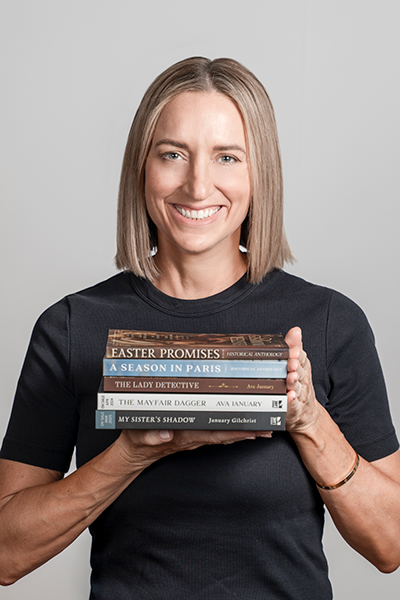January Gilchrist

Brisbane author January Gilchrist brings a fresh, high-energy approach to writing workshops. A former performing arts professional with a Bachelor of Creative Arts (Hons) and over 15 years of stage experience, she masterfully translates literary craft into engaging, hands-on learning.
Longlisted for the prestigious Richell Prize, various crime and romance specific prizes, and a Varuna Alumni, January is traditionally published across three genres, giving her a unique understanding of how different stories work. She has presented at major literary events including the 2025 Brisbane Writers Festival and Bouchercon 2024, and regularly facilitates workshops at libraries around Australia.
January leverages her versatility and stage-honed presence to create interactive, fast-paced sessions that demystify the writing process. She doesn't just teach writing—she creates an experience that makes creativity accessible and fun for participants of all ages.
Ideal for schools and organizations seeking a dynamic and relatable presenter, January's workshops are designed to ignite a lasting love of writing and equip participants with practical, confident storytelling skills.

Workshop Overview: "So You Want to Write a Murder Mystery"
- Set the stakes early – What’s at risk for the characters?
- Control the pace – Use short sentences and cliffhangers to create urgency
- Withhold information strategically – Give readers just enough, but never too much
- Use sensory details – Let the setting enhance the tension
- Foreshadowing and misdirection – Build suspense by hinting at what’s to come
Value: Learn how to write a tension filled, tight paced story, of any genre
Dramatic Whodunit: Write & Act Your Mystery
- Participants break into small groups.
- Each group writes a short mystery scene (10 mins) with a crime, clues, and red herrings.
- Then they act it out — using improvisation, role-play, character voices.
- Finish with feedback: What felt dramatic? Which clues hit? How did performance change pacing?
- You bring your theatre background to coach on voice, timing, tension.
Value: Writers learn how to think about character from an actor’s lens; performers sharpen storytelling.
Suspense Through Sound and Movement
- Explore how non-dialogue elements (sound, gesture, silence) build tension.
- Do a mini “silent scene” exercise: participants create a crime moment with just movement & expression.
- Then write a matching short mystery monologue or section.
- Discuss how pacing in performance informs pacing in prose.
Value: Helps writers understand subtext, tension, and rhythm; draws on performance skills to make scenes more vivid.
Character Interview: Deepening Dialogue
- In a “talk show” format, you (as host) interview participants who play their mystery characters.
- Writers develop a backstory, motive, secrets, tics and language
- During interview, you press them, provoke, dig into hidden motives.
- Afterwards, writers return to their draft and deepen character dialogue based on what emerged.
Value: Forces writers to think out loud like an actor; reveals character nuances they might not have considered and gives each character a true dialogue
Using Performance Techniques to Become a Better Public Speaker
- Participants explore how acting skills strengthen presence on stage.
- They break their talk into clear beats and practise shifting tone and pace to hold attention.
- They work through body-based drills that build grounded posture, deliberate movement and confident delivery.
- They test vocal exercises that add colour, rhythm and clarity.
- They rehearse sections of a talk aloud and refine timing, breath cues and transitions.
- They use short pre-performance rituals that steady nerves and sharpen focus.
Value: Participants learn practical performance skills that make their public speaking sharper, clearer and more engaging.
How to Plot a Story
- Participants begin by defining a protagonist’s clear desire and how that desire drives action.
- They add pressure by designing obstacles that expose cost, risk and emotional conflict.
- They map five turning points — setup, disruption, rising complications, crisis and resolution.
- They build stakes by crafting decisions that grow harder at each step.
- They test their plot by checking whether character choices cause the next event.
- They track threads like secrets, motives and relationships to avoid gaps in logic..
Value: Participants leave with a workable plot structure shaped by character, tension and clear narrative movement

Testimonials
January is a wonderful author and speaker — warm, witty, and incredibly engaging. She had the audience laughing, reflecting, and completely captivated from start to finish. Her ability to connect so naturally with readers made the event a truly memorable experience for us.
Whithorse Manningham LibrariesI’ve been fortunate to work with a lot of authors over the years, but January has been exceptional from the outset.
Bayside Librariesarrived feeling very much out of my depth and left believing I could actually do this. January is a practical and encouraging mentor.
Participant, Write Your Own Murder Mystery

the final chapter

my sister's shadow
Queensland
Speaker type
- Author
- Storyteller / Performer
- Motivational
Audience
- Year 10-12
- Tertiary
- Adult
- Teachers/PD
